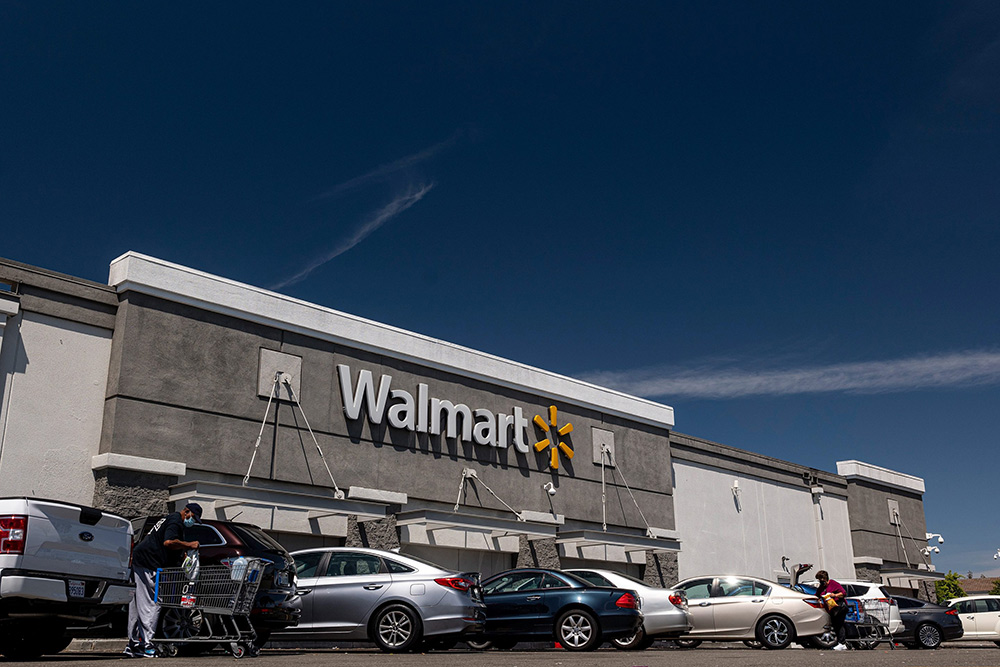
在6月初召開的年度股東大會上,,沃爾瑪宣布在新冠肺炎疫情期間,,公司的利潤創(chuàng)出新高,。這對公司及其股東們來說當(dāng)然是收獲滿滿的一年,。沃爾頓家族的個人財富增加了超過480億美元,公司前六位高管的總薪酬接近8,000萬美元,。
然而,,這些錢落入了高層的腰包,而新冠疫情卻在基層蔓延,,而且沃爾瑪拒絕執(zhí)行員工統(tǒng)一帶薪病假等常識性的政策,。相反,沃爾瑪拒絕發(fā)放危險津貼,在戴口罩,、保持社交距離和限制群聚等方面一直行動遲緩,。沃爾瑪沒有執(zhí)行防止疫情爆發(fā)的基本措施,甚至還反駁員工和客戶提出的健康與安全投訴,。
據(jù)United for Respect組織透露,,早在疫情爆發(fā)之初,隨著病毒在沃爾瑪商店和倉庫內(nèi)傳播,,有22名員工死于新冠肺炎,,至少在10個州有151處沃爾瑪設(shè)施曝出疫情。在新墨西哥州,,幾乎每家門店都爆發(fā)了疫情,。在俄勒岡州,由于一家門店未執(zhí)行疫情防護(hù)措施,,美國職業(yè)安全與健康管理局(OSHA)收到了20多條來自員工和客戶的投訴,。在馬薩諸塞州,職業(yè)安全與健康管理局對一名沃爾瑪員工的死因展開調(diào)查,,但沃爾瑪對此提出質(zhì)疑,,并且反駁了員工家屬提出的賠償,而同一家店鋪內(nèi)至少還有16名員工同樣染疫,。
因此在股東大會期間,,我們呼吁由一線員工和高管組成疫情工作組,指導(dǎo)未來公司的公共健康響應(yīng),。員工必須參與決策過程,,以確保門店對客戶和員工而言都是安全的,并且他們對于關(guān)乎自身利益的決策應(yīng)該有發(fā)言權(quán),,包括與工資和生命保健福利等關(guān)鍵問題有關(guān)的決策,,而且不必?fù)?dān)心遭到打擊報復(fù)。(眾所周知,,沃爾瑪自創(chuàng)立至今一直反對工會,,并且經(jīng)常違法法律規(guī)定,阻撓員工組織工會,。)
沃爾瑪反對組建工作組[它曾經(jīng)試圖拒絕在股東大會上討論這項提案,,但美國證券交易委員會拒絕了其請求],并聲稱其在提高員工工資和福利,、支持健康與安全以及促進(jìn)種族公平方面已經(jīng)做了足夠多的工作,。然而基層員工對沃爾瑪最近宣布的這一系列進(jìn)展無法茍同,而且大量關(guān)店,、職業(yè)安全與健康管理局的調(diào)查和多起訴訟以及11個州與哥倫比亞特區(qū)總檢察長對于其安全措施不足的批評,,都意味著沃爾瑪存在嚴(yán)重問題。
事實上,沃爾瑪去年的利潤付出了難以承受的代價,。由于收入差距,、種族歧視或語言障礙,許多沃爾瑪員工在工作場所外更容易受到新冠疫情的影響,。雖然沃爾瑪一直拒絕公布數(shù)據(jù)證實或否認(rèn)新冠疫情對其設(shè)施和員工造成的影響,,但Human Impact Partners組織最近的一份報告估計,從2020年2月至2021年2月,,至少有12.5萬名沃爾瑪員工感染了新冠病毒,,超過2,000人死亡。該報告還表示,,如果沃爾瑪在疫情爆發(fā)之前執(zhí)行了令人滿意的帶薪病假政策,,至少有7,618人可能不會染病,至少可以挽救133個人的生命,。
考慮到沃爾瑪是美國最大的黑人企業(yè)雇主,,該公司在疫情爆發(fā)之初不提供基本生活工資、適當(dāng)?shù)膸讲〖僬吆臀kU津貼的種種作為,,與其宣傳“黑人的命也是命”(Black Lives Matter)的活動形成了鮮明對比,。當(dāng)沃爾瑪公開反對聯(lián)邦政府的15美元最低時薪時,它所宣傳的那些言論變得毫無意義,。聯(lián)邦政府的這項政策能夠幫助消除結(jié)構(gòu)性種族歧視,。
除了種族問題以外,沃爾瑪?shù)恼咦寙T工繼續(xù)過著貧窮和不安全的生活,,以此為代價賺取的利潤在道德上也站不住腳跟,。由于沃爾瑪是美國工商業(yè)的佼佼者,因此投資者必須意識到,,沃爾瑪?shù)恼卟粌H在傷害其自己的員工,,也在影響著整個經(jīng)濟(jì)的健康。
研究結(jié)果已經(jīng)明確告訴我們:如果企業(yè)發(fā)放基本生活工資并維護(hù)員工的安全健康,,從中受益的將不只是員工本人,,對于經(jīng)濟(jì)健康同樣至關(guān)重要。如果美國的勞動者至少可以賺到15美元時薪,,有能力滿足醫(yī)療保健,、食物和住房需求,我們整個社會都將從中受益,。每10名美國人當(dāng)中,,無論來自任何黨派,有超過7個人都能夠直觀地理解這一點,,并且支持提高最低工資。
沃爾瑪及其股東必須做出選擇:繼續(xù)拖后腿;或者提高工資水平,,讓一線員工對公司未來的發(fā)展方向有更大的發(fā)言權(quán),。經(jīng)歷了過去的一年,沃爾瑪應(yīng)該不難作出決定,。(財富中文網(wǎng))
本文作者威廉·J·巴伯二世現(xiàn)任非營利組織Repairers of the Breach的總裁兼高級講師,,并擔(dān)任“窮人運(yùn)動:全國道德復(fù)興呼吁”(Poor People’s Campaign: A National Call for Moral Revival)的全國聯(lián)席主席。
辛西婭·莫瑞是沃爾瑪?shù)膯T工兼股東,,已經(jīng)在沃爾瑪任職20年,,同時擔(dān)任United for Respect組織的成員負(fù)責(zé)人。
翻譯:劉進(jìn)龍
審校:汪皓
在6月初召開的年度股東大會上,,沃爾瑪宣布在新冠肺炎疫情期間,,公司的利潤創(chuàng)出新高。這對公司及其股東們來說當(dāng)然是收獲滿滿的一年,。沃爾頓家族的個人財富增加了超過480億美元,,公司前六位高管的總薪酬接近8,000萬美元。
然而,,這些錢落入了高層的腰包,,而新冠疫情卻在基層蔓延,而且沃爾瑪拒絕執(zhí)行員工統(tǒng)一帶薪病假等常識性的政策,。相反,,沃爾瑪拒絕發(fā)放危險津貼,在戴口罩,、保持社交距離和限制群聚等方面一直行動遲緩,。沃爾瑪沒有執(zhí)行防止疫情爆發(fā)的基本措施,甚至還反駁員工和客戶提出的健康與安全投訴,。
據(jù)United for Respect組織透露,,早在疫情爆發(fā)之初,隨著病毒在沃爾瑪商店和倉庫內(nèi)傳播,,有22名員工死于新冠肺炎,,至少在10個州有151處沃爾瑪設(shè)施曝出疫情。在新墨西哥州,,幾乎每家門店都爆發(fā)了疫情,。在俄勒岡州,由于一家門店未執(zhí)行疫情防護(hù)措施,,美國職業(yè)安全與健康管理局(OSHA)收到了20多條來自員工和客戶的投訴,。在馬薩諸塞州,職業(yè)安全與健康管理局對一名沃爾瑪員工的死因展開調(diào)查,,但沃爾瑪對此提出質(zhì)疑,,并且反駁了員工家屬提出的賠償,,而同一家店鋪內(nèi)至少還有16名員工同樣染疫。
因此在股東大會期間,,我們呼吁由一線員工和高管組成疫情工作組,,指導(dǎo)未來公司的公共健康響應(yīng)。員工必須參與決策過程,,以確保門店對客戶和員工而言都是安全的,,并且他們對于關(guān)乎自身利益的決策應(yīng)該有發(fā)言權(quán),包括與工資和生命保健福利等關(guān)鍵問題有關(guān)的決策,,而且不必?fù)?dān)心遭到打擊報復(fù),。(眾所周知,沃爾瑪自創(chuàng)立至今一直反對工會,,并且經(jīng)常違法法律規(guī)定,,阻撓員工組織工會。)
沃爾瑪反對組建工作組[它曾經(jīng)試圖拒絕在股東大會上討論這項提案,,但美國證券交易委員會拒絕了其請求],,并聲稱其在提高員工工資和福利、支持健康與安全以及促進(jìn)種族公平方面已經(jīng)做了足夠多的工作,。然而基層員工對沃爾瑪最近宣布的這一系列進(jìn)展無法茍同,,而且大量關(guān)店、職業(yè)安全與健康管理局的調(diào)查和多起訴訟以及11個州與哥倫比亞特區(qū)總檢察長對于其安全措施不足的批評,,都意味著沃爾瑪存在嚴(yán)重問題,。
事實上,沃爾瑪去年的利潤付出了難以承受的代價,。由于收入差距,、種族歧視或語言障礙,許多沃爾瑪員工在工作場所外更容易受到新冠疫情的影響,。雖然沃爾瑪一直拒絕公布數(shù)據(jù)證實或否認(rèn)新冠疫情對其設(shè)施和員工造成的影響,,但Human Impact Partners組織最近的一份報告估計,從2020年2月至2021年2月,,至少有12.5萬名沃爾瑪員工感染了新冠病毒,,超過2,000人死亡。該報告還表示,,如果沃爾瑪在疫情爆發(fā)之前執(zhí)行了令人滿意的帶薪病假政策,,至少有7,618人可能不會染病,至少可以挽救133個人的生命,。
考慮到沃爾瑪是美國最大的黑人企業(yè)雇主,,該公司在疫情爆發(fā)之初不提供基本生活工資、適當(dāng)?shù)膸讲〖僬吆臀kU津貼的種種作為,,與其宣傳“黑人的命也是命”(Black Lives Matter)的活動形成了鮮明對比,。當(dāng)沃爾瑪公開反對聯(lián)邦政府的15美元最低時薪時,,它所宣傳的那些言論變得毫無意義。聯(lián)邦政府的這項政策能夠幫助消除結(jié)構(gòu)性種族歧視,。
除了種族問題以外,,沃爾瑪?shù)恼咦寙T工繼續(xù)過著貧窮和不安全的生活,,以此為代價賺取的利潤在道德上也站不住腳跟,。由于沃爾瑪是美國工商業(yè)的佼佼者,因此投資者必須意識到,,沃爾瑪?shù)恼卟粌H在傷害其自己的員工,,也在影響著整個經(jīng)濟(jì)的健康。
研究結(jié)果已經(jīng)明確告訴我們:如果企業(yè)發(fā)放基本生活工資并維護(hù)員工的安全健康,,從中受益的將不只是員工本人,,對于經(jīng)濟(jì)健康同樣至關(guān)重要。如果美國的勞動者至少可以賺到15美元時薪,,有能力滿足醫(yī)療保健,、食物和住房需求,我們整個社會都將從中受益,。每10名美國人當(dāng)中,,無論來自任何黨派,有超過7個人都能夠直觀地理解這一點,,并且支持提高最低工資,。
沃爾瑪及其股東必須做出選擇:繼續(xù)拖后腿;或者提高工資水平,,讓一線員工對公司未來的發(fā)展方向有更大的發(fā)言權(quán),。經(jīng)歷了過去的一年,沃爾瑪應(yīng)該不難作出決定,。(財富中文網(wǎng))
本文作者威廉·J·巴伯二世現(xiàn)任非營利組織Repairers of the Breach的總裁兼高級講師,,并擔(dān)任“窮人運(yùn)動:全國道德復(fù)興呼吁”(Poor People’s Campaign: A National Call for Moral Revival)的全國聯(lián)席主席。
辛西婭·莫瑞是沃爾瑪?shù)膯T工兼股東,,已經(jīng)在沃爾瑪任職20年,,同時擔(dān)任United for Respect組織的成員負(fù)責(zé)人。
翻譯:劉進(jìn)龍
審校:汪皓
At early June, at its annual shareholders meeting, Walmart celebrated the record profits it raked in during the pandemic. It certainly was a good year for the company and its owners. The Walton family saw their personal wealth increase by over $48 billion, and the company’s top six executives saw their total compensation reach nearly $80 million.
As money flowed to the top of the company, though, the coronavirus pandemic spread across the bottom, and Walmart refused to institute commonsense policies like universal paid sick leave for its workers. Instead, it stiffed them on hazard pay and dragged its feet on masks, distancing, and limiting crowds. The company failed to take basic actions to stem outbreaks and even pushed back against health and safety complaints from workers and customers.
Early in the pandemic, 22 employees died of COVID-19 and, as the virus spread throughout its stores and warehouses, at least 151 Walmart facilities in 10 states reported outbreaks, according to United for Respect. In New Mexico, COVID-19 hit nearly every store. In Oregon, over 20 OSHA complaints were filed by workers and customers about one store’s lack of COVID-19 safeguards. In Massachusetts, Walmart challenged an OSHA investigation into the death of one of its associates and contested her family’s claim for workers’ compensation, while at least 16 other workers also contracted COVID-19 at the same store.
This is why during the shareholder meeting, we called for the creation of a pandemic task force: a committee made up of frontline associates and executives to guide the company’s public health response moving forward. Workers need to be part of the decision-making process to make sure stores are safe for customers and employees and to have a say in shaping policies that affect them, including those related to critical issues like wages and lifesaving benefits, without fear of retaliation. (Walmart has been notoriously anti-union since its founding and has routinely broken the law to keep employees from organizing.)
Walmart has opposed the creation of a task force (it attempted to exclude the proposal from the shareholder meeting, but the Securities and Exchange Commission declined the request), claiming it is already doing enough to improve wages and benefits, support health and safety, and advance racial equity. But for workers on the ground, the company’s recent announcements on progress are riddled with fine print, and Walmart’s numerous store closures, OSHA investigations, and multiple lawsuits, as well as criticism of inadequate safety measures from the attorneys general of 11 states and the District of Columbia, point to gaping problems.
Indeed, the profits that Walmart made over the past year came at an unbearable cost. Many of Walmart’s workers were already vulnerable to COVID-19 outside of the workplace, due to income disparities, racial discrimination, or language barriers. Although the company has refused to publicly release any data to confirm or deny the toll of the virus on its own facilities and employees, a recent report from Human Impact Partners estimates that at least 125,000 Walmart employees contracted COVID-19 between February 2020 and February 2021, with over 2,000 deaths among its associates. The report also shows that if Walmart had an adequate paid sick leave policy in place before the pandemic hit, at least 7,618 people probably would not have become sick and at least 133 lives could have been saved.
Given that the company is the largest corporate employer of America’s Black workforce, its failure to provide living wages, adequate paid sick leave, and hazard pay early on in the pandemic stands in stark contrast to the company’s public campaign saying “Black Lives Matter.” These words are meaningless when Walmart openly campaigns against a federal $15 minimum wage, a concrete policy that would help undo structural racism.
Beyond the racial component, it is morally indefensible for Walmart to profit from policies that keep its workers poor and unsafe. Given the company’s leading position in American business, investors must realize that these policies are not just hurting workers; they’re impacting the health of the economy as a whole.
The research is clear: Living wages and a safe and healthy workforce are not only right for workers, but also for a healthy economy. When workers in this country are able to earn at least a $15 wage and to afford health care, food, and housing, our entire society benefits. More than seven in 10 Americans across both political parties intuitively understand this and support a minimum wage increase.
Walmart and its shareholders have a clear choice: continue to drag their feet, or raise wages and give frontline workers a stronger voice in shaping the direction of the company. After the year we’ve had, this shouldn’t be a hard decision.
William J. Barber II is president and senior lecturer of Repairers of the Breach and the national cochair of the Poor People’s Campaign: A National Call for Moral Revival.
Cynthia Murray is a 20-year Walmart associate and shareholder, and member leader of United for Respect.






